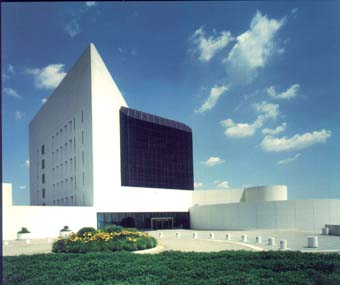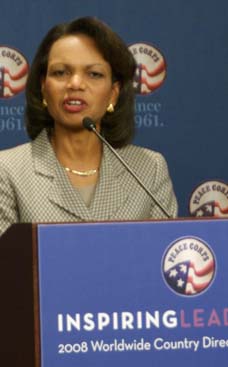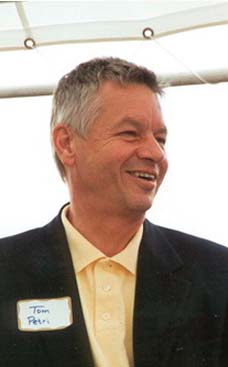
"A variety of material comprises the body of work held here. We have letters to friends and family from Volunteers, memos and training guides, newspaper articles documenting volunteer efforts, postcards, memoirs, photographs, ¼” reel tapes, financial records of expenses, scrapbooks – all sorts of original documents created and/or kept by Peace Corps Volunteers during or relating to their assignments. We also have Oral Histories; these consist primarily of audiotapes (cassettes) that researchers can listen to if they visit the library. Robert Klein acts as the coordinator for these efforts by training interviewers, who then use a guide to conduct interviews and prepare legal paperwork for these oral histories. I act as the main contact at the library for both Personal Papers and Oral Histories – all Papers are negotiated and handled directly between myself and the donor; all Oral Histories are conducted, prepared and sent to me by trained volunteers." John Coyne, editor of the "Peace Corps Writers" web site, served as a Peace Corps Volunteer in Ethiopia in the 1960's.
John Coyne interviews Jaimie Quaglino, at the Kennedy Library about the Peace Corps Archives
Recently I emailed the current curator of our Peace Corps College, Jaimie Quaglino, at the Kennedy Library about our collection, her background, and how RPCVs and PCVs can contribute to the Peace Corps Archives.
Here’s what Jaimie had to say.
Jaimie, how long have you been at the Library and with the Collection?
I have worked as an archivist at the Kennedy Library since 2005 and with the Returned Peace Corps Volunteers (RPCV) Collection since the beginning of this year. Before that, from 2001-2003, I worked part time assisting with archival work at the Kennedy Library while obtaining my double masters degrees in Archives Management and History at Simmons College in Boston, MA. Both my experience working with a variety of collections at the Kennedy Library, as well as my background in American 20th century history, have given me a good foundation to administer the RPCV Collection.
What is the history of the Peace Corps Collection?
The Collection has two major components to it – we collect both the Personal Papers of RPCVs and Oral Histories of RPCVs. The Personal Papers collection was established here about 25 years ago as the result of a Returned Peace Corps Volunteer reunion by the director of the Kennedy Library at that time, Dan Fenn. The Oral Histories have a different story. In 2000, Robert Klein, a member of Ghana I who had been conducting interviews with other Ghana I members in order to write his memoir, approached the library with the idea of conducting interviews with RPCVs from all countries, and creating a more formal Oral History Program that could document all RPCV experiences.
What is in the Collection?
A variety of material comprises the body of work held here. We have letters to friends and family from Volunteers, memos and training guides, newspaper articles documenting volunteer efforts, postcards, memoirs, photographs, ¼” reel tapes, financial records of expenses, scrapbooks – all sorts of original documents created and/or kept by Peace Corps Volunteers during or relating to their assignments. We also have Oral Histories; these consist primarily of audiotapes (cassettes) that researchers can listen to if they visit the library. Robert Klein acts as the coordinator for these efforts by training interviewers, who then use a guide to conduct interviews and prepare legal paperwork for these oral histories. I act as the main contact at the library for both Personal Papers and Oral Histories – all Papers are negotiated and handled directly between myself and the donor; all Oral Histories are conducted, prepared and sent to me by trained volunteers.
How many people use the Collection? And who are they?
We don’t collect independent statistics for use of specific collections, so I am not able to provide a concrete number. Generally speaking, however, most users of the collection are RPCVs themselves, or friends and family of RPCVs.
How does the Collection fit in with the whole scheme of the Library?
The mission of the John F. Kennedy Presidential Library is to collect material that documents the life and times of President John F. Kennedy. The Peace Corps Collection documents the efforts of a program that began during Kennedy’s administration, yet still continues today.
What is the Library looking for from Returned Peace Corps Volunteers?
The Library is especially interested in original materials (Personal Papers) and Oral Histories from the early volunteers and years of the Peace Corps – the 1960s in particular. Because of the passing of time, and because of the upcoming 50th anniversary of the program in 2011, it is crucial to document the efforts and experiences of the first volunteers while their stories and mementos are still available. We are interested only in original materials rather than copies of documents – so if you aren’t ready to part with your mementos yet, we don’t want to take them from you! Types of documents can include letters you might have sent to your family documenting your experiences, guides or memos you used during training, photographs relating to your work, and other materials that document your personal experiences working as a Peace Corps Volunteer.
How does one give documents to the Library to be included in the Collection?
Before documents can be accepted into the collection, we need to know how much material the RPCV has (100 letters in a large box, etc.), the dates of the material, and how the materials specifically relate to their Peace Corps experience in the country in which a volunteer was assigned to. We narrow and focus the materials to document the RPCV experience, while maintaining archival quality documentation. Currently, we collect representative sets (usually limiting them to less than 50) of photographs and slides. We also accept only the original documents rather than photocopies of letters. We request the dates of the RPCV’s service, title, and/or a brief description of their duties in the Peace Corps as well.
Once we have more information and make a decision to accept the materials, we ask the RPCV to send the material to me. I create a deed of gift with an Appendix that describes the donation and send the RPCV two copies that must be hand-signed. We use a standard deed of gift for donations of personal papers.
The major purposes of the deed of gift are to transfer title to the historical materials along to the Government and to establish the terms of access to the materials. The deed of gift provides for unrestricted transfer of title to the United States, a guarantee to the donor that the materials will be preserved in an appropriate depository and that the donor will have access to these materials on request during business hours, the terms of access, permission to dispose of materials deemed physically harmful to other items or historically insignificant, assignment of copyright, and a brief appendix that describes the materials being donated.
We ask the RPCV to sign and date two copies of the deed of gift and return them to me so we can pass them on to the Archivist of the United States to countersign. When we receive the deeds back from the Archivist, we send the RPCV a signed deed and retain one for our records.
While there are many steps in this process, they all work to ensure that documents are well-cared and accounted for and available for research at the Kennedy Library.
Thank you, Jaimie, for your time with this interview and for your work with our Peace Corps history.
Thank you. It is my pleasure. It’s a great job.









